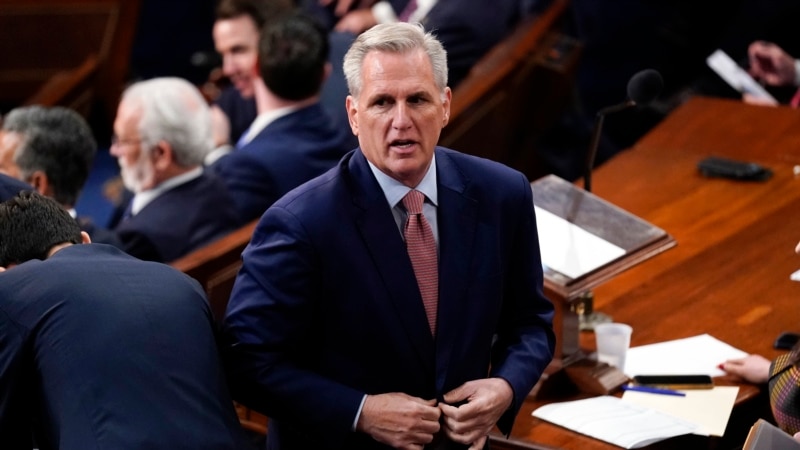USA – Voice of America
A band of arch-conservative U.S. lawmakers voted Tuesday against a fellow Republican, Kevin McCarthy, to become the next speaker of the U.S. House of Representatives, denying him a first ballot victory as the 118th session of the Congress opened.
It was the first time in 100 years that neither a Republican nor Democrat won the House speakership on the first round of voting to become the leader of the 435-member chamber.
A second ballot was underway, but it was unclear whether enough of McCarthy’s opponents would abandon their opposition to him and in turn vote for him.
Republicans will hold a narrow 222-212 majority in the House, with one current vacancy, requiring McCarthy, a California lawmaker for 16 years, to win at least 218 votes to claim the speakership. Under a provision in the U.S. Constitution, he also would become second in the line of succession to the U.S. presidency.
But 19 Republicans, many of them in recent weeks expressing the view that McCarthy was not conservative enough to lead House Republicans, voted for other Republican lawmakers, including representatives Andy Biggs and Jim Jordan, two vocal opponents of Democratic President Joe Biden.
Before the second round of balloting started, Jordan endorsed McCarthy. In turn, Representative Matt Gaetz nominated Jordan.
The first ballot vote count for the speakership was actually led by Democratic Representative Hakeem Jeffries, with all 212 Democrats voting for him, while 203 Republicans voted for McCarthy, 15 short of the 218 he needed.
The 57-year-old McCarthy, a staunch conservative himself, has sought for years to lead the House. Over the last several weeks, he has met repeatedly with his Republican foes to secure their support for his speakership bid.
McCarthy offered to change the House’s governing rules in several ways, including to permit snap votes to declare the speakership vacant and select someone else if they did not like his policy stances or how the party caucus was conducting its promised investigations of Biden and his administration.
But as the lengthy roll call vote unfolded, it became apparent that McCarthy did not have enough votes to win a majority.
Whoever the Republicans eventually might elect, McCarthy or someone else, would replace outgoing Democratic House Speaker Nancy Pelosi, who remains a House member and cast her vote for Jeffries.
Democrats, who have been locked in a 50-50 split with Republicans in the Senate the past two years, gained an edge in the nationwide congressional elections nearly two months ago and will hold a 50-49 majority in the new Congress, even as one-time Democratic Senator Kyrsten Sinema announced she is now an independent but would not change her voting philosophy. She usually has voted with the Democratic lawmakers and Biden.
McCarthy won 188 votes in a House Republican caucus in November, and since then has secured more support in his effort to reach the 218-vote majority for the speakership, as shown by the 203 votes he won on the first ballot Tuesday.
But the hard-right group of House Republicans oppose McCarthy’s bid for the speakership because they say he has not been devoted enough to the conservative cause and represents what they consider to be failed Republican leadership with Biden in the White House pushing for passage of progressive social policies.
Choosing a House speaker occurs even before representatives are sworn into office for their two-year terms. Lawmakers called out the name of their choice for House speaker from the floor of the chamber, and the same scenario will now play out in the second round of voting, and possibly beyond that.
Author Profile
Latest entries
 ScienceSeptember 22, 2024Evolving artificial intelligence capabilities in space
ScienceSeptember 22, 2024Evolving artificial intelligence capabilities in space LifestyleSeptember 22, 2024Paris Auto Show 2024: A-Z Preview Of All Debuts
LifestyleSeptember 22, 2024Paris Auto Show 2024: A-Z Preview Of All Debuts ScienceSeptember 22, 2024Algorithm makes robots aware of careless human behavior
ScienceSeptember 22, 2024Algorithm makes robots aware of careless human behavior HeadlinesSeptember 22, 2024Oktoberfest is open. The world’s largest folk festival all things beer begins after ceremonial keg-tapping
HeadlinesSeptember 22, 2024Oktoberfest is open. The world’s largest folk festival all things beer begins after ceremonial keg-tapping

